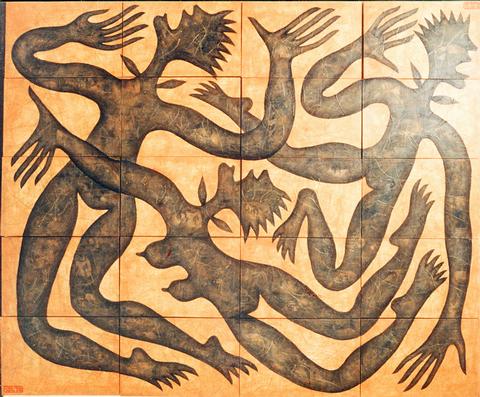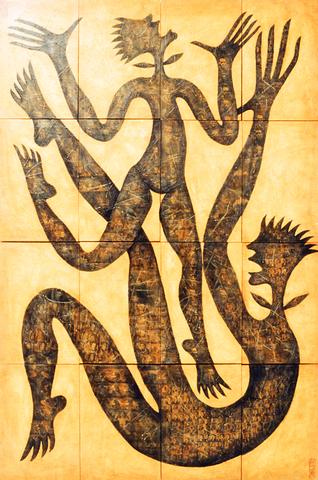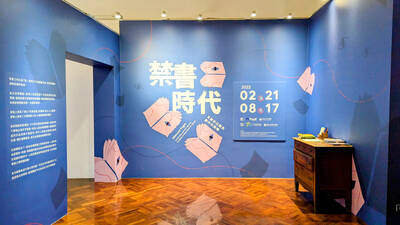This work was titled `Yellow River' in China, but I called it `Tamshui River' here. It was called by some other river's name when exhibited in Germany," said Chinese artist Ren Rong
Easily adapting the titles of his works to suit any country, the Bonn/Beijing-based artist views Ren Rong, his second touring exhibition since 1999, as a cultural exchange between countries. Titling the exhibition after himself, Ren had brought this "record of my life, people I had contact with and places I visited" to six cities in Germany before coming to Taipei. It will be heading for Taichung's Stock 20 in July before moving on to Hong Kong, Beijing, Jerusalem and more German cities.
River consists of 80 small-format paper cuts mounted on cardboard surfaces. They were in a flowing linear formation meandering across an entire wall in the gallery.

These black paper cuts are of "plant people"
The origin of the creature goes back to Ren's pre-college days. "I used to love painting human nudes. The human body's natural texture had great appeal for me. When placed in nature or among plants, it blends in with perfect harmony," Ren said in an telephone interview with the Taipei Times.
After college, it occurred to Ren to blend natural and human nudes into one creature, which, according to Ren, is ever-growing and freely reproducing.

PHOTOS COURTESY OF REN RONG
The fact that "plant people" means the "brain-dead" in Taiwan has been a constant joke among Ren's Taiwanese friends. "I invented the phrase in German. `Pflanzenmenschen' is a poetic word. For me, it represents the `ultimate exercise' -- constant movement, transformation and growth. Plant people are by no means stationary," Ren said.
These spiky-head plant people wear a hard-working expression. Their limbs strenuously stretch out and sometimes entwine with other plant people. The effect of exertion is further enhanced by their extending fingers and toes that seem to be reaching out to grab something.
The background cardboard is a collage of comics, maps, newspaper clippings and calligraphy in Chinese and German, which Ren has been collecting since he moved to Germany in 1986.
"Ren's popularity in Germany is due more than a little to the Oriental, or exotic, appeal of his paper-cuts," said Weng Suying (翁淑英), promotion chief at Hong-Gah. "The contrasting color scheme of red and black and the simplified human forms similar to traditional Chinese New Year decorations create a typical Chinese style," Weng said, referring to Ren's Positive and Negative, a collage of 200 paper cut plates. The Negative part is also on show at Hong-Gah.
For the Taiwan show, Ren made people plant people -- six new large paper-cuts on cardboard.
One of the series shows three plant people seemingly halfway in their stunt with details from an ancient painting Fire Mountain in Xinjiang in the background. Ren's photo portraits are densely superimposed on the silhouettes. Beeswax is sprayed on the bright earth-toned paper to create a warm texture. The vitality of the work seems to reach out from the paper.
"I was born under the element of fire. That fire mountain has special meaning for me. So it figures in my works. That's how I create works. My life and my work are one," Ren said, explaining the creative process of the works which are more like his diaries.

From censoring “poisonous books” to banning “poisonous languages,” the Chinese Nationalist Party (KMT) tried hard to stamp out anything that might conflict with its agenda during its almost 40 years of martial law. To mark 228 Peace Memorial Day, which commemorates the anti-government uprising in 1947, which was violently suppressed, I visited two exhibitions detailing censorship in Taiwan: “Silenced Pages” (禁書時代) at the National 228 Memorial Museum and “Mandarin Monopoly?!” (請說國語) at the National Human Rights Museum. In both cases, the authorities framed their targets as “evils that would threaten social mores, national stability and their anti-communist cause, justifying their actions

There is a Chinese Communist Party (CCP) plot to put millions at the mercy of the CCP using just released AI technology. This isn’t being overly dramatic. The speed at which AI is improving is exponential as AI improves itself, and we are unprepared for this because we have never experienced anything like this before. For example, a few months ago music videos made on home computers began appearing with AI-generated people and scenes in them that were pretty impressive, but the people would sprout extra arms and fingers, food would inexplicably fly off plates into mouths and text on

On the final approach to Lanshan Workstation (嵐山工作站), logging trains crossed one last gully over a dramatic double bridge, taking the left line to enter the locomotive shed or the right line to continue straight through, heading deeper into the Central Mountains. Today, hikers have to scramble down a steep slope into this gully and pass underneath the rails, still hanging eerily in the air even after the bridge’s supports collapsed long ago. It is the final — but not the most dangerous — challenge of a tough two-day hike in. Back when logging was still underway, it was a quick,

US President Donald Trump’s threat of tariffs on semiconductor chips has complicated Taiwan’s bid to remain a global powerhouse in the critical sector and stay onside with key backer Washington, analysts said. Since taking office last month, Trump has warned of sweeping tariffs against some of his country’s biggest trade partners to push companies to shift manufacturing to the US and reduce its huge trade deficit. The latest levies announced last week include a 25 percent, or higher, tax on imported chips, which are used in everything from smartphones to missiles. Taiwan produces more than half of the world’s chips and nearly all